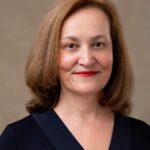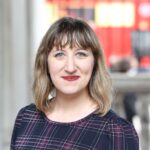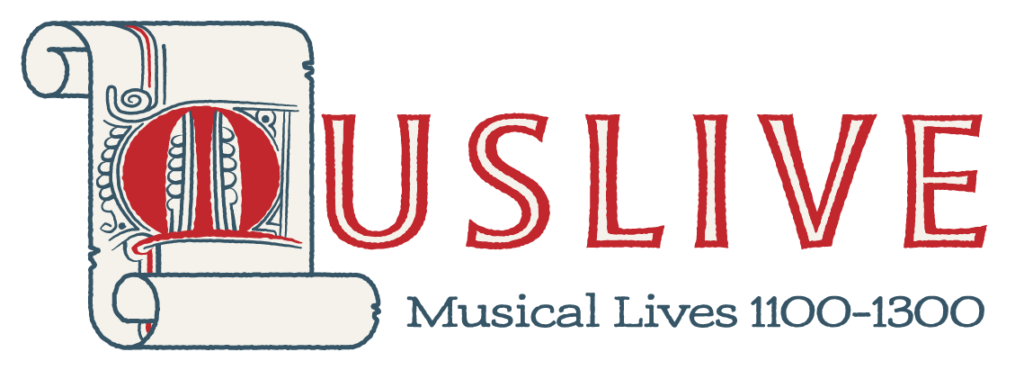Musical Lives is directed by the Principal Investigator, Emma Dillon. She is joined by three three-year postdoctoral research fellows and a part-time Research Assistant. Together, they form the core team.
Professor Emma Dillon, Principal Investigator

Emma Dillon is Thurston Dart Professor of Music (Medieval Music and Cultures) at King’s College London. She is a musicologist (BA and DPhil from Oxford University) with expertise in medieval European music and sound culture. She has held posts in universities in the UK (Bristol, KCL) and US (UC Berkeley, University of Pennsylvania), as well as fellowships in Princeton, Oxford and Cambridge. In addition to her scholarly work, Emma has worked extensively with performers and public partners to bring the musical past to life for a wider public (two recent examples include a film made for the recent Thomas Becket exhibition at British Museum, London and a guest curation of an exhibition of music manuscripts in the Parker Library, Cambridge). Musical Lives fulfils a lifelong ambition to bring music and history into closer dialogue. It also reflects Emma’s deep commitment to supporting the careers of new generations of scholars and performers.
Dr Alice Hicklin, Postdoctoral research fellow
Alice Hicklin, MUSLIVE’s historian, has collaborated on a number of international research projects since completing her PhD in Anglo-Saxon, Norse and Celtic at the University of Cambridge. Her research interests are broad, but in recent years she has been increasingly focused on documentary evidence: single-sheet charters, cartularies, and legalistic texts. She approaches charters not as corollaries to narrative works, but as literary constructions in their own right. In the MUSLIVE project, she uses documentary evidence to build up a picture of the familial, social and economic networks of the trouvères and their families. Alice is particularly interested in how developments in documentary practice might inform or be informed by our understanding of medieval music, its performance and reception. Charters were not only displayed and touched, but read aloud and even sung to audiences, placed alongside each other to create chains of memory that reflected both the present witnesses and more distant pasts.

Dr Betty Rosen, Postdoctoral Research Fellow

Betty Rosen, MUSLIVE’s resident Arabist/Hebraist, earned her PhD from the University of California—Berkeley’s Department of Middle Eastern Languages and Cultures, with a Designated Emphasis from Berkeley’s Program in Critical Theory, in 2023. She also holds an MA in Arabic Literature from SOAS University of London and an A.B. in Comparative Literature from Harvard College, and she has been a Fellow of the Center for Arabic Study Abroad (Egypt) and the American Institute for Maghreb Studies (Morocco). Her work explores the theories and practices of literary and linguistic creativity that are embodied in the works of medieval Muslim and Jewish Arabophone poets from Egypt, the Levant, Morocco, and Yemen. A violist and music lover, Betty is also extremely interested in the sonic dimension of poetry and the soundscapes of the medieval Arabophone world more generally, as well as in questions of craft(smanship), plurivocality and multilingualism, synesthetic experience, and the “secular” and “sacred” poetic voice.
Dr Geneviève Young, postdoctoral research fellow
Geneviève Young is MUSLIVE’s Old French literature specialist. Before arriving at King’s, she completed a PhD in French at the University of Cambridge which focused on how expressions of time (narrative, grammatical, and theoretical) shape the experience of death in the eleventh- and twelfth-century epic poems called chansons de geste. She is interested in how literature structures (or unmakes) national identities and her work continues to explore how participation in song and poetry—whether as a composer, copyist, performer, or audience member—forms and underpins communities and communal identities, whether historical or speculative. She is currently thinking with and around theories of performance, the constitution of communities around song cultures arising from crusade, and working on a book about affective temporalities in the French and Occitan epic traditions. Geneviève also holds degrees from the University of Minnesota-Twin Cities (French), King’s College London (Comparative Literature), and the College of St Catherine, in Minnesota (French), and has teaching experience in French language, literary and critical theory, and medieval literature.


